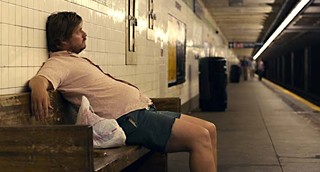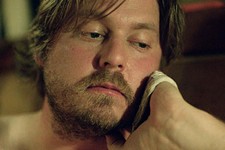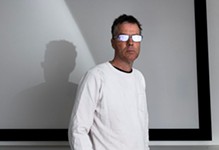No Catharsis in 'The Comedy'
Rick Alverson and Tim Heidecker talk about an A.O. Scott savaging and the danger in grand gestures
By Shawn Badgley, Fri., Nov. 30, 2012
As a man named Swanson, Tim Heidecker moves through Rick Alverson's third feature like a scourge. As with most characters in The Comedy, his name – and, from the perspective of most of those characters, most everything that happens in The Comedy – is inconsequential, revealed only in the credits. He spot-colors an otherwise meaningless existence with stunts ranging from the hilarious to the abject, the harmless to the devastating.
While his wealthy father clings to life in a coma, it is the 35-year-old Swanson who seems to be waiting to die, wandering around summertime Williamsburg with his cohort, uniformed in cutoffs and hipster shades. When you watch them playing wiffleball (one of Okkervil River frontman and erstwhile Austinite Will Sheff's several cameos), numbly guzzling PBR, and riding bikes for want of anything better to do, all set to William Basinski's moving instrumental "dlp 1.1," it is less an ode to joy than an elegy for ... something.
The performance that Alverson (The Builder, New Jerusalem) has coaxed from Heidecker (of cult favorite Tim and Eric Awesome Show, Great Job!) is itself something to behold. It is also controversial. Somehow, a film about a bored rich white guy who is not a serial killer has earned the tag of "transgressively brilliant" from the Village Voice. It has seen walkouts at Sundance (as well as successful screenings at SXSW and elsewhere) and a scathing review from The New York Times.
The Chronicle recently spoke by phone with the director and his lead actor in advance of their Nov. 29 appearance in Austin.
The Austin Chronicle: You have generated some pretty charged responses with this one. Are there any that have been of particular concern? For instance, I was reading A.O. Scott's review in the Times –
Rick Alverson: Ooohh, yeah.
Tim Heidecker: [laughs]
AC: So, you read it, too?
RA: I found that [review] incredibly insulting and hurtful. It's asinine, and it also showed a complete and utter lack of real attention to critical discourse. The subject matter of the film is the subject matter of the film, and this isn't some kind of propagandistic tirade in promotion of reckless behavior, misogyny, and racism. It's patently obvious that the ugliness of those things, and the way that they're portrayed in the film, is its own form of criticism. ... The moral ambiguity that's in the film is in there for a reason; the objectification of women that's in the film is in there for a reason. It's part of the subject matter. It's part of the palette of the thing.
TH: I'd like to think that that review is A.O. Scott's retirement letter from the world of serious film criticism. It's like, "I'm no longer engaged in talking about films seriously. I'm incapable of doing what I was assigned to do." I think what [Scott] was missing from the film was a dramatic courtroom finale, in which the character is tried and hanged for crimes against humanity. We should have just taken our cue from the abortion that was Flight, that movie everybody's coming all over, which is one of the worst things I've ever seen.
AC: Tim, do you think your character undergoes any kind of change by the end of the film?
TH: Oh, I feel like my interpretation of watching it is that there's a sense that the ice might be thawing. There becomes an awareness of a problem and some kind of hope for the future. I see that, and some other people have, and maybe some people won't. It's very subtle, and one thing Rick is interested in is not creating these melodramatic character arcs, like Ebenezer Scrooge in the last two minutes of A Christmas Carol, like suddenly he's the nicest guy in the world. We're tired of those kinds of stories. This is about a guy who, really, [we're] only witnessing a couple of months, or maybe even a month, I'm not sure, of a character's life ... Those kinds of changes are very small, or don't happen at all. That's the kind of movie Rick wanted to make.
RA: The idea that we experience so many epiphanies in these movies – it's such a potentially dangerous misconception about the way the world actually functions. Audiences are conditioned to some degree to expect to just drop in and see the epiphany, to see the grand gesture and the moment of transformation. A denial of that needs to happen. There needs to be counterweight to some of that idiocy ...
Movies operate temporally so much better than they operate didactically. In order for us to be told things, it removes all the real potency of what movies can achieve, which is experiencing time and experiencing the gradations of it. There are moments in there when Swanson is reflective, and there are moments when he's meditative, and there are moments of exhaustion, and there are moments of ebullience. All kinds of small changes and shifts go on. But this idea of linear transformation is not just secondary, but almost unimportant. There's no concrete, single place that we arrive except death. And to peddle anything else in films is disingenuous.
AC: Tim, you've talked elsewhere about how you and Swanson are similar in some ways, in terms of mannerisms and speech patterns, and that the role didn't require a lot of method-acting groundwork. But clearly you can't be exactly like him, I hope. Can you talk about inhabiting a character like this, and whether you felt much vulnerability as an actor, especially one who hadn't done anything like this in the past?
TH: I try not to get too analytical or hypothetical about anything, because it's just too hard to know how anything's going to go. I just kinda went by my instincts and consultations with a few people, that this seemed like an exciting, interesting thing to do. The film ends up being very severe and very heavy and dark, but there wasn't that feeling or mood throughout the process. There wasn't that kind of dark energy or atmospheric music hanging over everything. A lot of it, and a lot of filmmaking in general, is fun. It's fun to collaborate with good, smart people. There were some specific issues with the nudity and that kind of stuff that were uncomfortable for me, or challenging, but you get through that, and nothing was ever too insurmountable for my psyche to deal with it. I went into it with no exceptions, and tried to be generous and give an honest performance, and tried to let Rick run the show and let it be his movie and let him make it. That's all I can do.
A longer version of this interview appeared Wednesday, Nov. 28, on the Screens blog.
Premiere Plus Party (But Not in That Order): How To Celebrate 'The Comedy' in Austin
On Thursday, Nov. 29, 7-9pm, End of an Ear (2209 S. First) will host a listening party of The Comedy soundtrack, which features music from Here We Go Magic, Gayngs, Bill Fay, William Basinski, and more. Tim Heidecker and Rick Alverson will be in attendance at the party, which runs from 7-9pm, and is followed by an Austin Film Society screening at 9:30pm at the Alamo South Lamar. Alverson and Heidecker will take part in a post-film Q&A. For ticket info, see www.austinfilm.org.
The Comedy opens theatrically in Austin on Friday, Nov. 30. See Film Listings for review.










